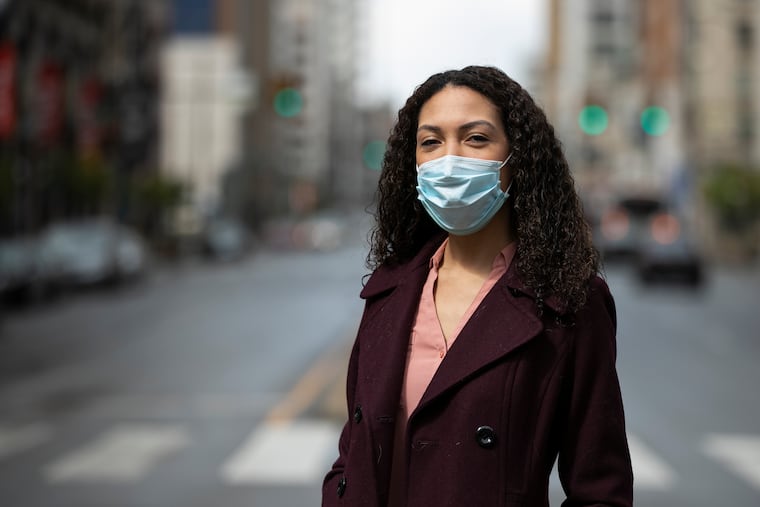Philadelphia-area health-care students are helping patients in isolation connect with loved ones
The project hits home for Temple University medical student Stephanie Javier-Fagbemi, whose uncle died from complications from COVID-19 in isolation, denying the family of the ability to "say goodbye."

For Stephanie Javier-Fagbemi, a third-year medical student at Temple University, the death of her beloved uncle was difficult enough.
His passing due to complications from COVID-19 was another reminder of the lethal threat of the global pandemic.
But one aspect of Mario Javier’s death on April 5 — in a hospital in Hartford, Conn. — hit home in an especially devastating way for his niece: his isolation, both in physical terms and in his inability to communicate even electronically with his loved ones prior to his death.
“We weren’t able to say goodbye,” Javier-Fagbemi said. “That has really complicated the grieving process for my entire family.”
The heartbreaking experience has prompted Javier-Fagbemi to volunteer with Connect for COVID-19, a nationwide initiative that seeks to deliver smart devices, such as cell phones, tablets, and laptops, to hospitals and other long-term care facilities to help ease social isolation for vulnerable patients.
“We’ve all seen the stories of how difficult this has been,” said Manraj Singh, a Princeton University graduate and national lead for Connect for COVID. “We’re just a bunch of twenty-something-year-olds across the country trying to help.”
Locally, Connect for COVID is operating in coordination with the new Philadelphia Organization of Health Professions Students (POHPS), a 2,500-member coalition of students from various preprofessional, health-related educational programs across the area who have banded together to provide information and support in the battle against the COVID-19 outbreak.
Founded by University of Pennsylvania medical student Ramie Fathy, POHPS is engaged with a variety of efforts, including the collection and distribution of personal protective equipment; developing and sharing informational resources; coordinating and publicizing wellness programs, especially for health-care workers; and partnering with a local nonprofit, CollegeTogether, and area restaurants to provide regular meals for health-care workers.
» READ MORE: Two volunteer groups partner to feed 3,500 hospital workers
“We were all in this weird limbo,” said Fathy, a third-year medical student at the University of Pennsylvania’s Perelman School of Medicine. “There are so many health-care profession schools in the Philadelphia area, so many students who wanted to help in some way, given our training and skill sets and familiarity with the health-care system.
“We started a Facebook group and we initially had something like 200 members and I was like, ‘That’s amazing, 200 members, we can do so much.’
“But almost right away, we shot up to almost 2,500 members. It’s been rewarding to see so many students from all over the area want to help in any way they can.”
Fathy said similar organizations are emerging in other areas of the country, with hopes for establishing a nationwide network to coordinate efforts, share ideas and best practices, and develop plans to remain in operation long after the worst of the COVID-19 pandemic is over.
“We’re applying for nonprofit status, setting up bylaws,” Fathy said. “This is something we want to continue far into the future.”
For now, though, obtaining smart devices and delivering them to isolated patients is a top priority.
Yentli Soto Albrecht, the Philadelphia region’s Connect for COVID lead coordinator, said the organization has begun to work with Penn Medicine as well as Temple and Jefferson hospitals to arrange for the distribution of the items.
Singh said a secure drop-off location, manned by POHPS volunteers, has been established at 3610 Hamilton Walk. (There’s more information at dhcproject.org/covid19 as well as a GoFundMe site, gofundme.com/f/connect-for-covid19, to allow for financial donations.)
Once devices are donated or purchased, Connect for Covid volunteers clean and test them. They then coordinate with medical, maintenance, and IT staff at hospitals to install and program them into individual rooms as well as instruct patients and their families on how to use them.
“Everyone sees how difficult the ‘no-visitation’ policy has been,” Soto Albrecht said. “It’s so important that we try to help people connect with their family and friends in such difficult times, to know they are not alone.”
Javier-Fagbemi said the Connect for COVID project is vitally important given current “no visitor” restrictions — and deeply personal to her, given the circumstances of the death of her uncle, who was in his 60s.
“I don’t want what happened to my uncle and to my family to happen to anyone else,” she said. “We had no idea how sick he was. We couldn’t contact him. He couldn’t contact us. We couldn’t advocate for him. We couldn’t visit him.
“When we found out he had died, it was such a shock because we had no idea how bad his situation was.”
Javier-Fagbemi said the devices will enable patients to connect with families and with medical staff, lowering the risk of infection. Patients on ventilators would benefit, too, she said: “Even if it’s a one-way conversation, with family and friends able to talk to them, that would mean so much."
Javier-Fagbemi’s last connection with her uncle was a photo that his partner sent her just before he was hospitalized.
“I was motivated to try to help anyway I could before I lost my uncle,” Javier-Fagbemi said. “But when something like this hits home, it makes you even more motivated to try to make sure it doesn’t happen to another family.”